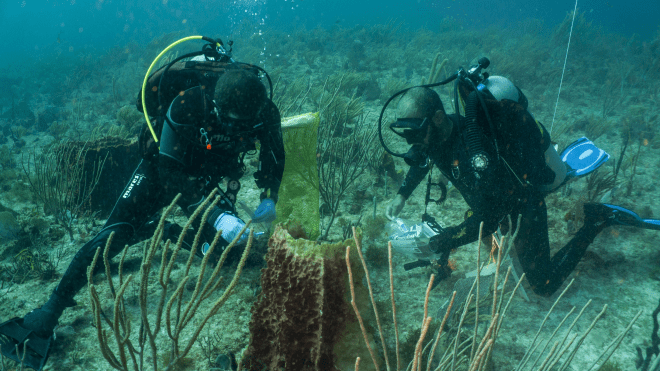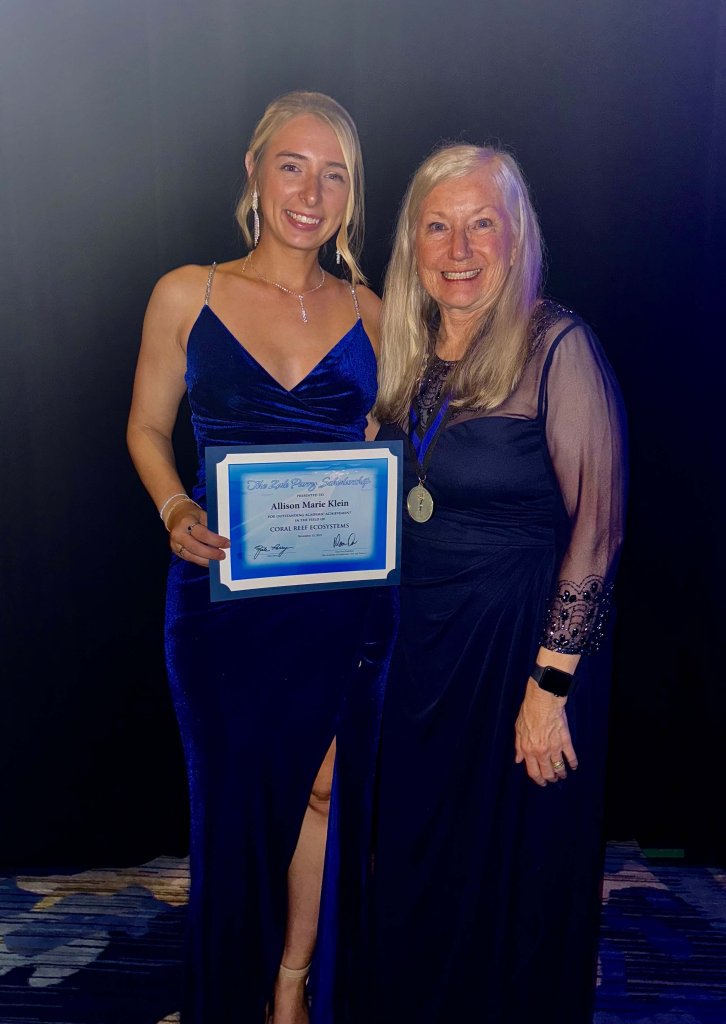Mission Critical: To Conserve and Restore Tropical Coral Reefs
Two Roger Williams University alumni are diving deep into their research and making breakthroughs important for coral reef conservation

BRISTOL, R.I. – At sunrise, one day last fall, Allie Klein ’20 suited up in fins and SCUBA tank, grabbed her hammer and chisel, and headed out for a day of work with her dive team from Florida Atlantic University in their underwater office in the coral reefs of Jupiter, Fla. More than 1,000 miles southeast at the University of Puerto Rico, Alex Veglia ’16 works inside a research laboratory studying the corals endemic to the shores of the Caribbean country. While these two alumni are pursuing different research endeavors, they share a similar goal: To preserve and restore vital tropical reef ecosystems around the world.
Both Klein and Veglia are diving deep into coral research and working toward critical breakthroughs in coral reef conservation, leveraging skills they learned as undergraduate students at Roger Williams University. Klein’s research is focused on a transplant experiment, to determine if corals will keep their thermal tolerance, which is their ability to survive warmer temperatures, to prepare them for an artificial coral reef structure that Hawaii is installing.
Addressing climate change and coral disease, which are decimating Caribbean coral reefs, Veglia’s research explores how viruses may hinder or help coral survival in the face of these threats to inform management strategies for Puerto Rico’s reefs.
Coral reefs worldwide are facing impacts from climate change, overfishing, habitat destruction, and pollution, according to the world’s coral scientists. As ocean temperatures continue to rise, coral reefs have been experiencing bleaching events – in which rising ocean temperatures cause them to expel the algae living in their tissues and turn completely white – at an unprecedented frequency, threatening their persistence. Disease outbreaks are becoming more common, and coral reefs all over the globe do not have enough time to naturally repair themselves. A study published in the journal One Earth reports that coral reefs have declined by over half since the 1950s. The Intergovernmental Panel on Climate Change projects that coral reefs worldwide will decline by a further 70 to 90 percent by 2050, due to a 1.5-degree increase in global temperature. This is why coral reef conservation and restoration research is vital to save these diverse underwater ecosystems.
Can corals keep their thermal tolerance when relocated?
Klein, who received her B.S. in Marine Biology and Environmental Chemistry from RWU, is currently getting her Ph.D. at Florida Atlantic University in the Integrative Biology program, with a specialty in coral reef ecosystems. For her research, Klein investigates coral reef resilience and whether corals can handle an extreme change in the temperature in their environment.
Klein received an American Academy of Underwater Sciences (AAUS) Research Scholarship to fund her Ph.D. research. This prestigious award is granted to only two recipients nationwide, placing Klein among an elite group of esteemed scholars.
She is conducting a transplant experiment where she transfers corals from a warm body of water to cooler waters to see if the corals will keep their thermal tolerance and survive in this new environment. Klein is conducting this research for the state of Hawaii, for a large artificial reef structure to be installed in Oʻahu. These tests are being done first to ensure that corals will survive. Is thermal tolerance conserved across coral species and ecosystem temperature ranges? This is what Klein aims to find out.
“I’m doing molecular sampling to see if there are any genes consistent with thermal tolerance, and if those genes can be transferred to the next generation of corals,” Klein said.
Why are coral reefs important to preserve for the health of the oceans? “Corals are the most biodiverse ecosystem in the ocean,” Klein said. “They are ecosystem engineers, creating the 3D structure of the reef that provides habitat and shelter for anything from marine invertebrates to algae to pelagic species, from sharks to the beautiful parrot fish.”
What role do viruses play in coral reefs and how can they be prevented?
Veglia, who has a B.S. in Marine Biology and a minor in Chemistry from RWU, currently works as an assistant professor in the biology department at the University of Puerto Rico-Mayagüez. He researches coral reef virus ecology and evolutionary biology, as well as invertebrate genomics.
Though scientists still are just starting to learn about their significance, viruses play an extremely important role in the human microbiome contributing to longevity and overall health in humans. Scientists agree that it is the same in coral reefs, but even less is known about viruses in these fragile, threatened systems. Veglia’s goal is to identify what viruses are present in coral reefs and what role they play in the health and survival of corals and the other organisms important to the health of coral reef ecosystems.
“We are at the point in the field where we know viruses are extremely abundant and diverse in healthy and diseased invertebrates like corals or sponges, but we don’t know which viruses are interacting with who and how these virus-host interactions affect the health of coral reefs and the organisms that inhabit them,” Veglia said.
He stressed how vital corals are to the ecosystem and how they carry many benefits. Some products found on coral reefs have important pharmaceutical compounds that we use in our everyday lives, that are antiviral and anti-microbial, he said. “For human benefit alone, we need to have these ecosystems healthy because there are reservoirs of unknown biotech or pharmaceutical compounds that we could potentially use.”
Growing an interest in coral research at RWU
Both Klein and Veglia have their current research pursuits rooted in research they did in their undergraduate studies at RWU.
For Klein, the thermal tolerance work she is exploring now in her Ph.D. program is rooted in the fundamentals of coral microbiology that she learned while doing research in RWU Marine Biology Associate Professor Koty Sharp’s laboratory. Her work was focused on the microbiome of local Rhode Island corals. Though she is now working in tropical corals, Klein employs the very same tools of molecular biology and microbiology that she used to study temperate New England corals. Her research often brings her below the ocean’s surface, and she credits her ability to jump right into fieldwork in Florida’s reefs to her undergraduate dive training at RWU. As part of the RWU undergraduate Research Diving course, Klein became certified as an AAUS research diver. As a junior, she traveled to Bermuda for a semester abroad, where she studied reef ecosystems at RWU’s partner institution Bermuda Institute of Ocean Sciences (BIOS). She said she knew that Bermuda had some of the most pristine reefs in the world and jumped at the opportunity to see them up close.

Now a master diver, Klein has received the 2023 Zale Parry Scholarship through the Academy of Underwater Arts and Sciences (AUAS), named for Rosalia Parry, the pioneer of American women’s SCUBA diving. Klein received her award by getting a personal phone call from Parry herself and an invitation to the 2023 New Orleans Grand Isle (NOGI) Gala in New Orleans, known as the “Oscars of Diving” – the highest recognition within the scientific SCUBA community.
“I plan on using the scholarship funds for advanced technical dive training, as I become a key member of our lab’s mesophotic dive team, and to help support my travels to academic conferences where I will share my dissertation work and the importance of dive-related research,” Klein said.
Veglia credits his interest in viruses to RWU Biology Professor Marcie Marston and says his ability to get hands-on experience with virus research starting in his first year as a student set the foundation for his successful career as a scientist and researcher.
“Dr. Marston got me interested in viruses in my freshman year,” he said. “I never thought I’d be interested in viruses, but she showed me the light, and it has been growing ever since that day 10 years ago.”
Since graduation, Veglia has been a leader in his field, pioneering coral virology. Recently, his research was published in the Nature journal, Communications Biology scientists understand how corals and their partners fight off current viral infections.
From RWU research labs to labs around the world
Klein’s and Veglia’s accomplishments exemplify how RWU prepares and equips its students to take on important global issues as students and beyond in their careers. Exploring the many challenges facing the world’s coral reefs and finding solutions to help conserve and restore these ecosystems will have a meaningful impact on the environment, economy and society, according to Sharp, who also serves as the Director of the Center for Environmental and Economic Development at RWU.
“Coral reefs are major global biodiversity hotspots. They’re also extremely important in terms of economic value, supporting tourism, fishing, and food production, and important for coastline and shoreline protection,” Sharp said. “Living, healthy coral reefs can provide their adjacent coastlines with robust, physical protection from storm surge.”
Sharp shared that most students who have worked in her Coral Microbial Ecology Lab have gone to work in coral reef science, microbiology, molecular biology, or other related fields. “Students who work in our research labs gain tools from broad scientific fields that they can then fine-tune as they move into specialized fields,” translating what they learned as undergraduates into their scientific career pathways, she said.
In December, Veglia visited RWU to teach Biology and Marine Biology undergraduate research students a suite of advanced approaches to analyze DNA data samples from the local coral, Astrangia poculata, or Northern Star Coral, which is studied in depth in Sharp’s lab. In addition to the visiting lecture, Veglia has been collaborating with Marston and Sharp on a National Science Foundation-funded research project, using tools from molecular biology to learn more about the role of coral microbiomes on resilience to climate change, which he shared in a classroom presentation with students.
Sharp was excited to see Veglia return and share his knowledge with current students. “It was a thrill to see our current students learning leading-edge techniques from our alums – and now we’re able to build new collaborations with him based on his unique skill set and expertise. He has already taught us so much. We’re excited about it on all levels,” she said.
Marston traveled to Puerto Rico in January to visit Veglia and work with his students at the University of Puerto Rico-Mayagüez. “As a professor, it is so rewarding to have a former undergraduate student become a colleague and collaborator and to be able to learn new techniques from them. I look forward to continuing to work on research with Alex. We hope to start research projects where undergraduates at RWU and the University of Puerto Rico-Mayagüez can work together,” she said.
Sustainable Living Advice from RWU Alumni
To help advance coral restoration efforts, Allie Klein '20 and Alex Veglia '16 share some everyday actions you can take in your day-to-day life to help the environment.





